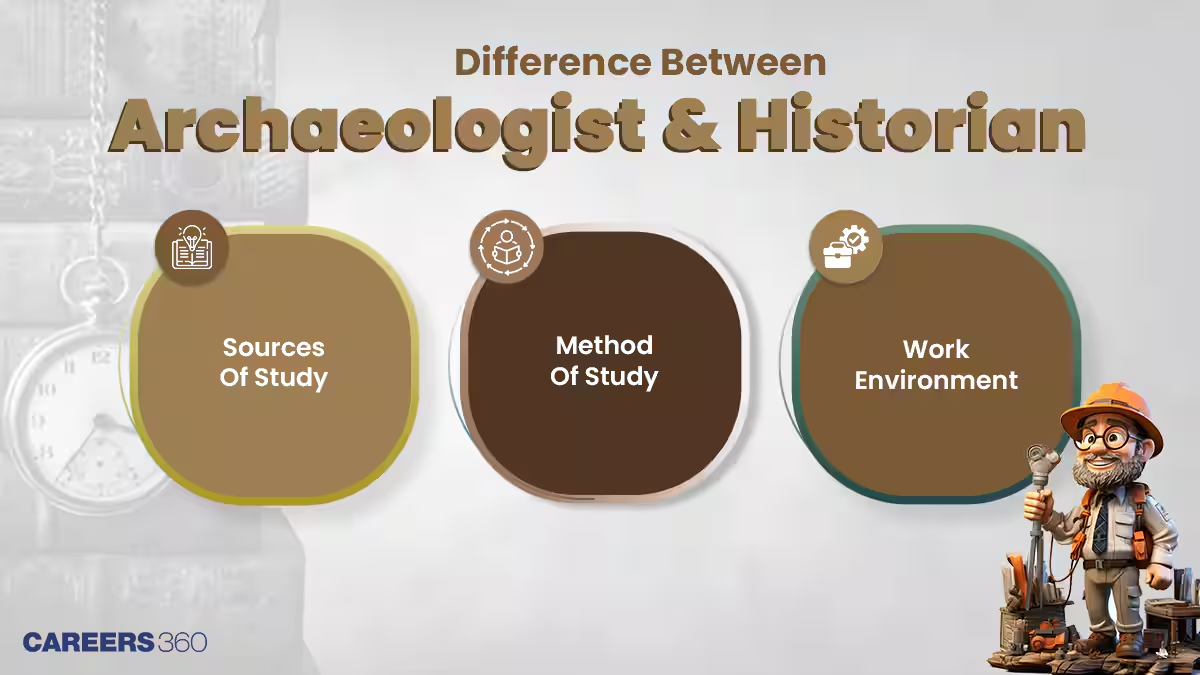Difference Between Archaeologist And Historian
Archaeology and History are two important disciplines to understand how the world became the way it is today. Archaeologists and historians are professions that primarily deal with uncovering and interpreting historical events, but they differ significantly in their approach and methodology. This article explores archaeologists' and historians' comparison to clearly understand the difference between archaeologist and historian. This analysis will help us understand how these professions have contributed to our understanding and perception of history while exploring the difference between archaeology and history.

Who Is An Archaeologist?
An archaeologist is someone who gathers insights from the past by analysing artefacts or physical remains of the past. The information collected through material evidence helps piece together the history and culture of ancient civilisations. Their primary analysis includes customs, values, behaviour and social patterns of prehistoric societies, which further highlights what’s the difference between archaeologist and historian.
Key Skills needed to become Archaeologist
In-depth knowledge of history
Pay attention to details
Strong analytical skills
Skills to effectively record through photographs, drawings and writings
Ability to plan research projects
Who Is A Historian?
Historians are experts in history. They study across different time periods, geographical areas and social phenomena. To explain the causes and consequences of past events, they rely on existing written records of history. Their study is mainly concerned with humanity by investigating and analysing the historical journey of the human race.
Key Skills needed to become Historian
Research skills
Critical thinking and analytical skills
Deep understanding of historical data
Chronological reasoning
Archaeologist vs Historian – What Sets Them Apart?
Archaeologist vs Historian: What exactly is the difference between these two professions? A historian is a professional who studies history through existing written records. But an archaeologist is someone who gathers information from artefacts and remnants to understand the creation and development of an ancient civilisation. It is important to understand various factors that contribute to the difference between archaeologist and historian. The table below explores this archaeologist and historian comparison in detail.
Differences | Archaeologist | Historian |
Sources Of Study | An archaeologist excavates artefacts and physical evidence from archaeological sites and analyses them through various scientific methods. They study archaeological remains like pottery, ancient infrastructure, culture and language. They clean, arrange and analyse these material remains to further identify and classify them with accurate historical context. | Historians study past events through various sources, which can be classified into two categories, primary and secondary sources. Primary sources include first-hand accounts or direct evidence of the time period being studied. This includes manuscripts, official documents, stone carvings, and pottery. Secondary sources are research papers, documentaries, academic studies and biographies, which further show the difference between archaeology and history. |
Method Of Study | Archaeology utilises excavation methods to unearth artefacts and implements. To categorise this physical evidence into specific timelines, an understanding of the historical context is important. For this, various methods like radiocarbon dating, DNA analysis and stratigraphy are used. Pursuing Archaeology courses helps learners gain expertise in these techniques. | Historians deeply research various written documents to frame a narrative. They study the author, the context of writing, and potential bias to derive an understanding of the historical event. To ensure accuracy, the narrative is verified through cross-referencing with multiple sources. |
Work Environment | Archaeologists engage in physically demanding procedures in archaeological sites to uncover potentially significant material remnants. Their work involves outdoor research, excavation, cleaning of the artefacts and collaboration with scientists. | A historian's work is mainly within libraries, archives and universities. Their primary concern is to interpret historical data with its significance in the present time. |
Conclusion
Archaeologists and historians provide society with a deep understanding of history. This comparison between archaeologists and historians helps us understand how both these disciplines are important in providing an accurate narrative of history. Learning about the difference between archaeologist and historians enables us to appreciate their combined effort towards a precise interpretation of civilisation's past and present.
Frequently Asked Questions (FAQs)
A BA in history or related field is the minimum requirement but a MA in history can open doors to bigger opportunities.
Key skills of a historian includes,
Research skills
Critical thinking and analytical skills
Deep understanding of historical data
Chronological reasoning
With one year of experience an archaeologist in India can earn an average of 6 Lakhs per year.
(Salary Source: Ambitionbox)
To become an archaeologist you need to complete your BA in archaeology,anthropology or in related fields.
An archaeologist studies human history through the physical remnants of the past. While a historian relies on written records to understand history and culture.